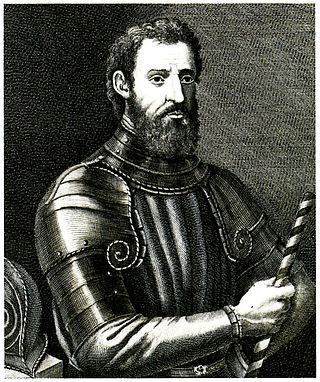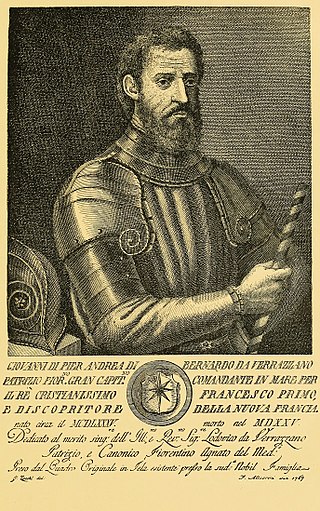Related Research Articles

1609 (MDCIX) was a common year starting on Thursday of the Gregorian calendar and a common year starting on Sunday of the Julian calendar, the 1609th year of the Common Era (CE) and Anno Domini (AD) designations, the 609th year of the 2nd millennium, the 9th year of the 17th century, and the 10th and last year of the 1600s decade. As of the start of 1609, the Gregorian calendar was 10 days ahead of the Julian calendar, which remained in localized use until 1923.

Year 1524 (MDXXIV) was a leap year starting on Friday of the Julian calendar.
Year 1485 (MCDLXXXV) was a common year starting on Saturday of the Julian calendar.

Giovanni da Verrazzano was an Italian (Florentine) explorer of North America, who led most of his later expeditions, including the one to America, in the service of King Francis I of France.
The year 1813 in science and technology involved some significant events, listed below.
The year 1796 in science and technology involved some significant events.
The year 1749 in science and technology involved some significant events.
The year 1869 in science and technology involved some significant events, listed below.
The year 1858 in science and technology involved some significant events, listed below.
Nationality words link to articles with information on the nation's poetry or literature.
Events from the year 1845 in the United Kingdom.
Events from the 1490s in England.
Events from the 1560s in England.
Events from the 1570s in England.
Events from the 1600s in England. This decade marks the end of the Elizabethan era with the beginning of the Jacobean era and the Stuart period.
Events from the 1610s in England.
Events from the 1620s in England. This decade sees a change of monarch.

La Dauphine was a three-masted sailing vessel that served as the flagship of the explorer Giovanni da Verrazzano on his first voyage to the New World while seeking a shipping passage to China from Europe.
The year 1528 in science and technology included a number of events, some of which are listed here.

The Cèllere Codex is one of three surviving copies of a manuscript originally created in 1524. This manuscript was a letter sent by Giovanni da Verrazzano (1481–1528) to King Francis I of France describing the former's navigation of the East Coast of the United States. Verrazzano was an Italian who lived in France, and he undertook his voyage in Francis' service. The King, prompted by the French mercantile community, charged Verrazzano to discover whether there was a direct passage from the Atlantic to China and Japan. These were important trading partners—particularly in silks and spices— for most European nations.
References
- ↑ Paine, Lincoln P. (2000). Ships of Discovery and Exploration. New York: Houghton Mifflin Harcourt. p. 37. ISBN 0-395-98415-7.
- 1 2 Grun, Bernard (1991). The Timetables of History (3rd ed.). New York: Simon & Schuster. p. 235. ISBN 0-671-74919-6.